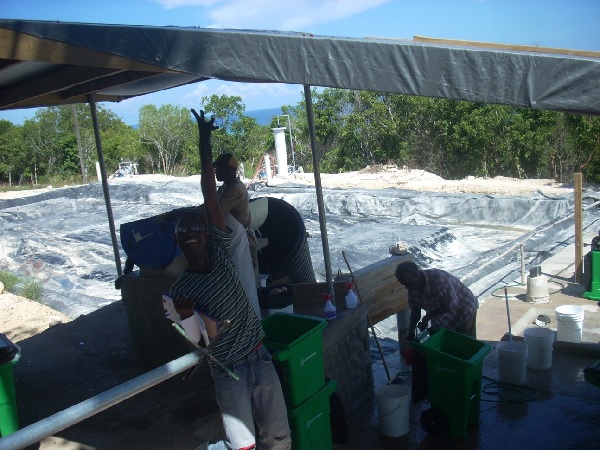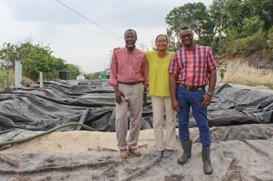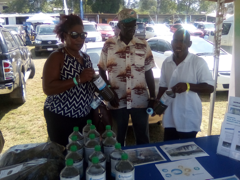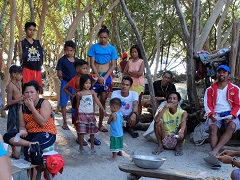Apply now to join our next cohort of Community Science Fellows and Community Leads!

Photo Courtesy of Carol Lue
 The Team
The TeamAccording to the Food and Agriculture Organization of the United Nations, food waste accounts for 8% of global greenhouse gas emissions and is a major contributor to climate change. Its great majority, particularly in developing countries, is sent untreated to landfills, worsening an already severe environmental and climate hazard. For small island developing states such as the Caribbean, the problem is exacerbated as the land available for landfills is quite limited. In addition, in the Caribbean, tourism is a major food waste generator and source of greenhouse gas emissions. About 40% -50% of solid waste generated by the sector (hotels and cruise ships) are discarded food. However, the integration of organic waste recycling options into waste management for this sector remains a missed opportunity to significantly reduce the quantities of food waste entering the landfills and to help mitigate greenhouse gas emissions in a considerable way.
Through Thriving Earth Exchange, CaribShare Biogas (CSB) engaged the expertise and service of Wale Adewunmi, a Soil and Environmental Scientist with nearly three decades of field and laboratory experience. His specialties include the environmental chemistry of soils and managing waste in soil, as well as reclaiming and remediating contaminated soils. Dr. Wale spent 2 weeks in Jamaica, working together with Carol Lue, the Executive Director of CSB, meeting with key stakeholders.
Specifically, he assisted with achieving the Organic Fertilizer Commercialization project objective by meeting with regulators and laboratory officials at the Bureau of Standards Jamaica (BSJ), in Kingston, an agency that sets product labeling requirements and provides testing services needed to assess the fertilizer’s safety and nutrient composition. He consulted with the Bureau’s testing laboratory to review its ability to perform the tests required to characterize the digester product. And, once the fertilizer sample was tested, Dr. Wale then interpreted the results to determine the fertilizer’s Nitrogen – Potassium – Phosphorus (NPK) ratio, the essential element for the product labelling. With this labelling information, the fertilizer has been packaged and is now market ready.
Additionally, Dr. Wale also assisted with achieving the Organic Fertilizer Adoption project objective by meeting with key stakeholders and potential users of the organic fertilizer: small farmers in Braco, Trelawny, a commercial farmer at Rose Hall, and a Field Extension Manager with the Rural and Agricultural Development Authority (RADA). Dr. Wale orientated these stakeholders to the organic fertilizer, promoting its merits.
To fund Dr. Wale’s trip to Jamaica, CSB received financial assistance from the U.S. Agency for International Development (USAID) and its country representative, ACDI/VOCA.
In addition to Dr. Wale’s 2 weeks engagement with CSB in Jamaica, the team would meet monthly or as needed via skype calls.
Essentially, Dr. Wale determined the fertilizer’s Nitrogen – Potassium – Phosphorus (NPK) ratio, the essential element for the product labelling. With this labelling information, the fertilizer has been packaged and is now market ready. The buyers of the major agro stores are now currently trying the product in anticipation of having island wide distribution soon.
The small farmers in Braco Trelawny have benefitted from the project by receiving free fertilizer to help enhance their crop productivity and yields.
Additionally, the farming community in general, both small and commercial farms, will benefit now by having a reliable and affordable source of premium organic fertilizer in CaribShare. CSB is filling a great market need as the other organic fertilizer brands on the market are imported and more costly. With the successful implementation of this pilot along with plans to develop additional biogas plants in other parishes, CSB is therefore positioning itself to promote and increase the use of organic fertilizer as well as organic farming across the country.
Hopefully, other communities will be inspired to recycle and make productive use of their organic waste in this way, while encouraging organic farming.
The team attributes the following factors to their success:
If they were to do this project again, Carol and Wale would seek additional time and funding to engage more stakeholders, such as more farmers and farming groups.
For others pursuing similar community science projects, the team recommends working towards long term funding, and be open to continuing the work beyond the duration of typical Thriving Earth Exchange projects.
Montego Bay is located on the northern coast of Jamaica, the main tourist region in the island. While tourism is a leading economic driver and employment source, it is also one of the largest waste generator in the country. Immense potential exists to sustainably dispose and turn waste from this thriving industry into energy, environmental, and social benefits.
Like much of the Caribbean, Jamaica faces challenges in adapting to climate change and becoming more resilient. Hotels in the vicinity are interested in taking sustainability initiatives to mitigate the impacts of climate change on the area and the island. Likewise, farmers would like to increase their yield despite the adverse effect climate change may have on their locales.
CaribShare Biogas is a social enterprise and registered charity in Jamaica solving the challenges of renewable energy, climate change, and rural poverty in the Caribbean. CaribShare turns organic waste from hotels and small pig farms into biogas and fertilizer for sale, to help solve the challenges energy access and rural poverty in Jamaica.
In the early stages of converting hotel waste to fertilizer, CaribShare is looking for assistance in understanding how the fertilizer will help local crops and what other types of fertilizers could be developed from the waste they will receive from both hotels and local farms. Much of the work CaribShare has done is on the designing of the plant and focusing upon biogas. They would now like to get technical advice and expertise to develop appropriate fertilizers for the region.
Carol Lue, Executive Director, CaribShare Biogas will serve as community lead on this project.
CaribShare Biogas has a few recent university graduates that would benefit from shadowing the selected scientist(s).
CaribShare Biogas is open to working with a local or international scientific partner.

Mitchell Roffer met with Thriving Earth Project Manager Sarah Wilkins during a recent trip to speak with legislators
From Melbourne, Fla.: Science liaison Mitchell Roffer recently made a trip to Capitol Hill to discuss ways to improve the National Flood Insurance Program (NFIP). He writes: I visited Senator Rubio’s office and spoke with Wes Brooks (Legislative Assistant) on a few inter-related subjects including water quality, environmental monitoring and the NFIP. Brooks indicated that Senator Rubio is co-sponsoring a bill (S.1368) to improve the NFIP. I also visited Senator Scott’s office and spoke with Kyle Hill (Legislative Correspondent for the economy and environment), as well as Representative Posey along with his staffers George Cecala (Communications Director and Deputy Chief of Staff) and Valentina Valenta (Legislative Director). Rep. Posey said he would support bills that would improve the NFIP. Overall, I think my time was well spent. I presented a two-page summary to all in person and via email in my thank you letters after my meetings.
From Montego Bay, Jamaica: Here we are introducing our premium organic fertilizer at the recent Hague Agricultural Show. Made from the anaerobic digestion of food waste and cow manure,

The Montego Bay project team introduces their organic fertilizer at an agricultural show
our fertilizer is as an environmentally friendly alternative to synthetic fertilizer that will significantly improve soil fertility and help to build climate resilience in farming in Jamaica. A group of students from Troy High School visited our biodigester plant last week to learn about biogas technology and the natural process of recycling food waste into biogas and fertilizer. Managers from Sandals Royal and Sandals Montego Bay visited our site recently to inspect our fertilizer drying beds. We are glad for their support, and we are so pleased for the past 2+ years to be recycling and diverting food waste from eight hotels in Montego Bay from landfills.

The community gathers to hear about the process for an Environmental Impact Assessment on March 9, 2019. Image Courtesy AGHAM and AKAP KA-Manila Bay.
From Bulacan Province, Philippines: Around 700 families in the artisanal fishing community of Taliptip in Bulacan, Philippines, are in danger of displacement and livelihood loss as a 2,500-hectare aerotropolis is set to be built as part of the Philippine government’s infrastructure development program, “Build, Build, Build”. Taliptip is part of the long coast of Manila Bay, an economically important and biodiversity-critical natural harbor in the Philippines’ capital region.
Difficulties in acquiring information about the proposed aerotropolis, which would reclaim vast waterfronts, prompted the community to ask AGHAM, an organization of volunteer scientists, to assess the livelihood and cultural loss and geohazards which they may face once the aerotropolis is built.
In the initial visits of the team, volunteer geologists, community workers, and archaeologists from AGHAM and local community organizers AKAP-KA Manila Bay determined the scientific assessment needs of the community of Taliptip. One highlight of the relationship formed between the scientists and the fisherfolk residents is the participatory scientific investigation we call “Counter-EIA”. The EIA or Environmental Impact Assessment is a process which requires project proponents to thoroughly assess all beneficial and adverse impacts of a project on the concerned area. The counter-EIA, therefore, is an EIA where fisherfolk themselves become active agents in the scientific investigation and the production of knowledge through their communal and historical experiences, together with the scientists’ expertise.
Capacitating the fisherfolk of Taliptip will include training them on field methods like handling GPS devices, and interpreting hazard maps and mapping ecological resources. Ultimately, with the of AGU Thriving Earth Exchange and local scientists, we hope to equip the fisherfolk with the scientific knowledge they need so they could maximize their participation in democratic processes and help them engage in negotiations with the project proponents for their rights to livelihood and rights of residence.

Ericka Naklicki examines a soil boring in Graniteville, Staten Island. Image: Courtesy Sarah Lipuma
From Staten Island, NY: On March 23, Ericka Naklicki, Professional Wetland Scientist, conducted a preliminary wetland assessment with Gabriella Velardi Ward and Sarah Lipuma in Graniteville, Staten Island. The preliminary investigation included a walkthrough of the site to assess habitat and to collect some soil borings to obtain a general idea of soil conditions. They also observed signs of hydrology and identified dominant tree species. Ericka intends to return to the site in May or June to survey herbaceous plants and examine the soils during drier conditions. The preliminary investigation has been written into a report and will be shared with community leaders, Gabriella and Sarah, soon.
Carol Lue is the Founder and Executive Director of CaribShare Biogas, a social enterprise in Jamaica recycling organic waste into clean energy and fertilizer. As a 2012 winner of the IDB’s 2012 Ideas Energy Innovation Contest, CaribShare is pioneering biogas solutions in the Caribbean. In partnership with Ch4 Biogas, a leading Canadian biogas design-engineering firm, they are operating the first biogas plant in Jamaica designed to generate electricity on a sustained basis. They plan to expand throughout the Caribbean to capture the huge underused supply of organic waste coming from hotels and farms in the region.
After working in business, international development, and sustainability for over 15 years in North America, Carol returned home to fulfill her passion of developing a social enterprise that would both build climate resilience and strengthen rural livelihoods. CaribShare diverts organic waste from landfills, increases the use and supply of organic fertilizer, and provides farmers generous cash rewards as meaningful income for supplying their waste. Carol holds a MBA degree in International Economics & Finance from Brandeis International Business School and a MS degree in Environmental Planning from the University of Toronto.
Wale Adewunmi is a Soil and Environmental Scientist with nearly three decades of field and laboratory experience. In addition to managing biosolids utilization and quality, he conducts studies related to critical water quality issues and provides solutions to process issues in wastewater operations and biosolids management. His previous work includes land-application of biosolids, biodegradation of PCBs, pesticide transport and analysis, fate of compounds of emerging concern in wastewater and soil environments. A Certified Professional Soil Scientist, he holds Ph.D in Environmental Science, M.S. in Soil Science, and B.S. in Agronomy. He is a member of the Soil Science Society of America, American Society of Agronomy, Water Environment Federation and the International Union of Soil Science where he promotes protection of water resources, and advances soil science education among K-12 students.
Top 3 Lessons from an Entrepreneur recycling organic waste into Environmental & Social Good in Jamaica Download
(c) 2024 Thriving Earth Exchange